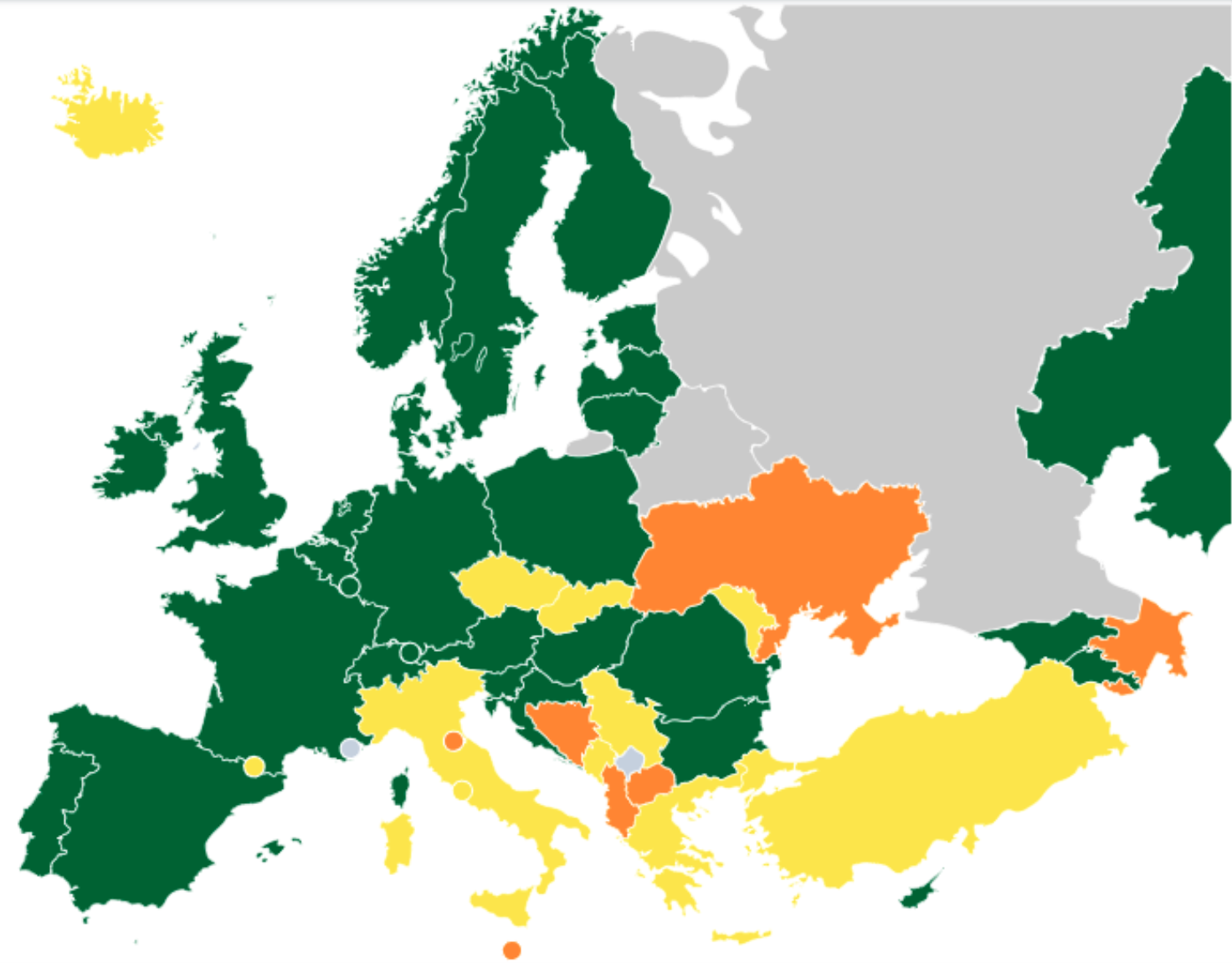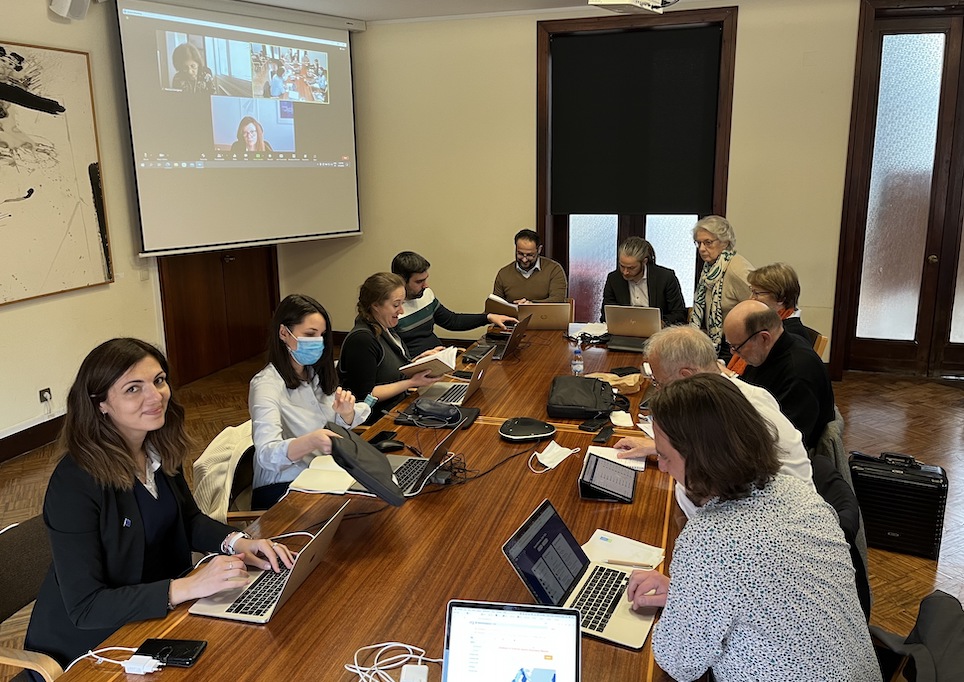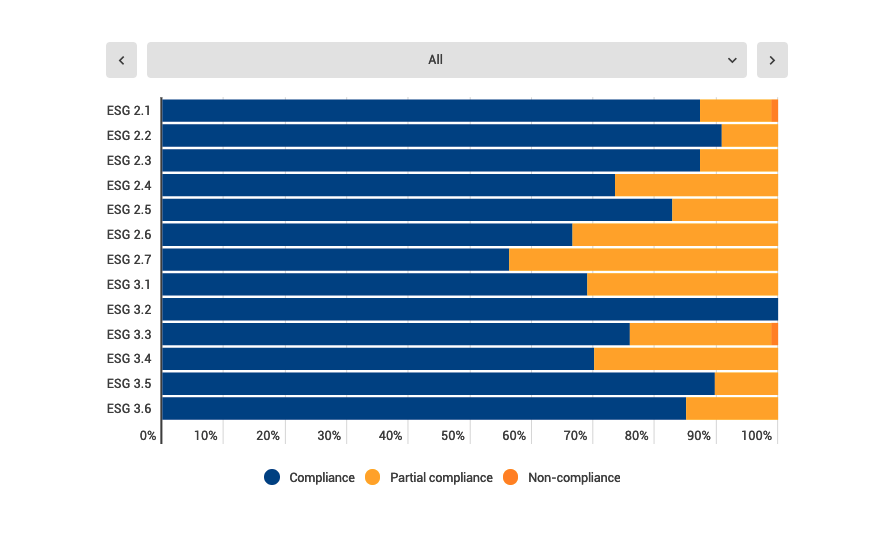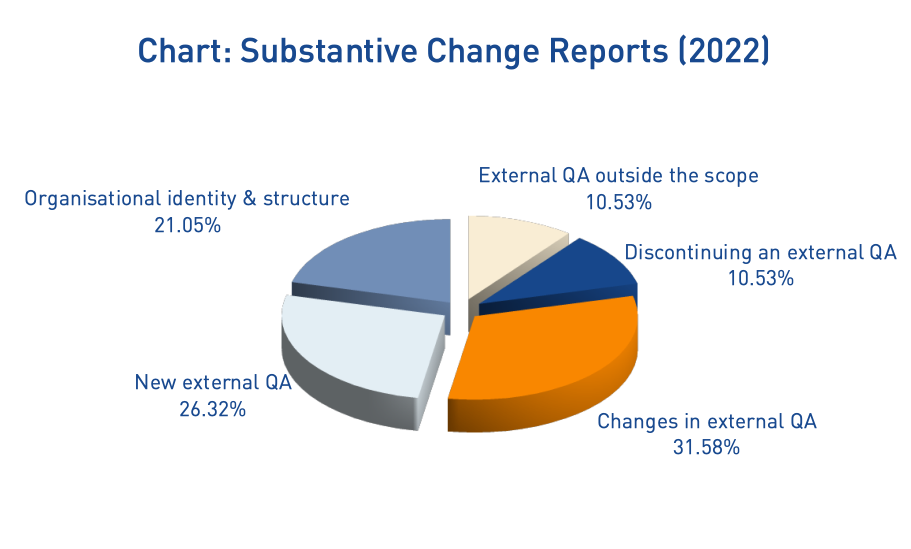Managing the Register
EHEA Key Commitment
Compared to the previous year, countries’ advancement of new legal regulation to support external QA arrangements in line with the ESG, has stagnated. In 2022, higher education institutions in 29 of the 48 EHEA member countries (or 32 of 54 higher education systems, if counting Belgian & UK systems) were subject to regular external quality assurance in line with the ESG, carried out by EQAR-registered agencies.
While one new agency was registered on EQAR in 2022 (GAC), the coverage of EHEA systems has not increased, since this agency is largely responsible for considering procedures coordinated by other German agencies as a basis for decision-making.
The stagnation in countries’ advancement of their legal regulation to support external QA arrangements in line with the ESG, is expected to take a turn in the aftermath of the pandemic. There has been an increased interest expressed by countries in their national plan of work (as part of the TPG C activities) to address issues regarding ESG compliance, as well as an active involvement in the activities of the IMINQA project i.e. peer learning activity, staff mobility etc.
In 2023, the Register Committee is expected to consider eight initial applications for registration, that are likely to expand the EHEA coverage on systems ‘aligned with the ESG’.

Map Legend
Green: A fully functioning quality assurance system is in operation nationwide, in which all higher education institutions are subject to regular external quality assurance by an agency that has successfully demonstrated compliance with the Standards and Guidelines for Quality Assurance in the EHEA (ESG) through registration on EQAR
Yellow: A fully functioning quality assurance system is in operation nationwide but only some higher education institutions are subject to regular external quality assurance by an agency that has successfully demonstrated compliance with the ESG through registration on EQAR
Orange: A quality assurance system is in operation nationwide, but has not (yet) been fully aligned to the ESG
Red: No quality assurance system is in operation
Decisions on Inclusion and Renewal of Registration
At the end of the 2022, 51 quality assurance agencies were listed on the Register (*). One agency was newly admitted to the Register in 2022. During the year, the Committee took decisions on nine applications, of which eight were approved. Out of the nine decisions, seven related to renewals of registration, while two to initial applications. A list of all decisions taken in 2022 and previous years can be accessed here.
(*) When an agency with an initial application is accepted to the Register, the “listed since” date on the Register is the date of publication of the external review report (rounded off to the first day of the month concerned), which can be in a different (previous) year than when RC decision was taken. That is why four agencies that were newly admitted to the Register in 2023, are now included on the overview list (see annexes) of registered agencies in 2022. The list also includes one suspended Russian agency.
In 2022, the Register Committee took the first decision on applications based on targeted reviews, a newly introduced procedure by EQAR (in close collaboration with ENQA) which allows agencies whose registration has been renewed at least twice, to undergo a more focused external review. More about targeted reviews can be found here.
Applications for registration received in 2022
In 2022, EQAR received 19 applications for registration. All of the applications were found to be eligible and agencies were encouraged to proceed with the next steps of the external review process (i.e. organising the site visit):
- Eight of the applications submitted to EQAR in 2022 were for initial inclusion on the register.
- One of the applications has been withdrawn in the meantime (and expected to be re-submitted in 2023 after major national legal changes will have been implemented).
- Two of these applications were submitted by agencies that are undergoing a focused review (i.e. a follow up review after being deferred from inclusion on the register in 2022 and 2021).
- The rest of the applications (11 in total), were submitted by agencies whose registration was expiring in 2022. Five of these agencies decided to undergo a targeted rather than a full review. Decisions on these applications for renewal of registration are to be taken throughout 2023.
|
Decisions |
||
| Approved |
Rejected |
|
| Initial registration |
1 |
1 |
| Renewal of registration |
7 |
0 |
|
Applications |
||
| Initial registration |
8 |
0 |
| Renewal of registration |
11 |
0 |
|
Status |
||
| Waiting for a report |
16 |
|
| Currently being considered |
1 |
|
| Completed |
1 |
|
| Withdrawn |
1 |
|

Applicants’ level of ESG compliance
On our webpage “Analysis of Decisions” we have various interactive charts/maps on applications and ESG compliance, as well as some other statistics on the application process and Register Committee decision-making, among which a fully interactive chart illustrating the ESG compliance level achieved by applicant agencies (successful and unsuccessful), broken down by various dimensions.

Monitoring of Registered Agencies
In 2022, one in four agencies reported a substantive change. The Register Committee considered 13 change reports, two of which were addressed as part of the agency’s decision for renewal of registration. While there is a slight decrease compared to the previous year (of 16 change reports) the timeliness of reports has improved with over 50% of changes now being reported within less than six months since the change was enacted.
For most of the reports the Committee decided to “take note” of the new developments within the agencies . Following the consideration of one change report, the Committee suspended the registration of the respective agency, requesting an extraordinary revision of its registration. Following the consideration of its representation and being assured that the aspects that led to its suspension were addressed, the Committee reinstated the agency on the register.
All reports included changes in the agency’s external quality assurance activities, from initiating new activities (26.3%), to introducing changes in existing activities (31,6%) to discontinuing existing activities (10,5%) or introducing activities outside the scope of the ESG (10,5%). These changes illustrate that many agencies have adapted or expanded their range of external quality assurance activities. A few of the agencies also reported changes in their organisational structure and identity (21.5%) (see chart).
In some cases, these changes came as a direct result of the new legal frameworks or regulations in countries where the agencies operate, allowing or facilitating the use of the European Approach (EKKA, AAC-DEVA). In other countries the changes resulted from the diversification of the agency’s portfolio of external QA activities i.e. ACPUA (Spain) introduced an activity of voluntary nature that focuses on higher education institutions’ commitment to the Sustainable Development Goals; ARACIS (Romania) launched new external quality assurance activity for the evaluation of the establishment of new doctoral study domains; MAB (Hungary) developed its procedure and standards for the accreditation of medical education higher education institutions using WFME standards; NOKUT (Norway) introduced an evaluation of quality in education that employs data and information from comparative assessments, including examples of good practice from other institutions.
In 2022, EQAR did not receive any third-party complaint on the work of a registered agency.

Revised Procedures for Applications and Appeals and Complaints Procedure
Following the self-evaluation and external evaluation of EQAR in 2020/21, a few changes were made to the Procedures for Applications as well as the Appeals and Complaints Procedure in 2022:
- The external review documentation has to be submitted no later than 6 months after the site-visit and no later than 12 months after EQAR confirmed eligibility of the application.
- Registered agencies are only eligible for renewal of registration if all substantive changes that occurred since their last application have been duly reported.
- An agency’s registration may be suspended in certain scenarios, such as failing to report substantive changes, failing to provide a further change report, failing to pay the application or annual listing fee (with more than 6 months delay after invoicing), if the registration criteria are no longer fulfilled (e.g. in case of no compliance with a standard), or a delay of more than 3 months in submission of review reports following the expiry of the agency’s registration on EQAR.
- The timeline for appeals has been shortened: an appeal need to be submitted within 40 days (before: 90 days) and the Appeals Committee is expected to decide within 60 days (before: 120 days).
- All eligible ongoing and withdrawn applications for registration/renewal are now made public on a specific page.
The Guide for Agencies was updated accordingly to reflect the changes.
Targeted reviews
Targeted Reviews are an approach co-created together with ENQA in 2021, aimed to reduce “review fatigue” for those agencies that have already successfully passed two reviews against the ESG. During the targeted review process, the review focuses on ESG standards that were partially compliant during the last review and/or ESG standards possibly affected by recent changes. Each targeted review also addresses standard 2.1 and at least one other standard, chosen by the agency as an enhancement area (Read more about targeted reviews).
Since the launch of the targeted review procedure, the EQAR Register Committee confirmed the terms of reference for five QA agencies who applied for this procedure. Two of the five agencies have completed their targeted review in 2022 and renewed their registration in EQAR (see resulting reports for AQU and SKVC). For the completed procedures all panel’s conclusions were followed by the EQAR Register Committee.
Given the small number of cases, a further analysis will need to follow. The analysis will reflect on the added value of such reviews, on whether they provide enough information to retain confidence in the agency; if the remaining standards (not in focus area) remain fulfilled; if any important aspects are missing; should any changes be made in the targeted review methodology; if there is a workload difference between targeted and full reviews etc. Two years after implementation (mid 2023) EQAR, jointly with ENQA, will assess the experience with targeted reviews.
Liaising with review coordinators
EQAR has continued its close collaboration with ENQA as the coordinator of the majority of reviews for EQAR registration. Since March 2022, EQAR and ENQA staff have held monthly (online) coordination meetings on current reviews and applications. These regularly meetings have helped to facilitate a smooth and prompt exchange of information.
In 2022, EQAR contributed to an ENQA training for agency reviewers, a seminar for recently reviewed agencies as well as a seminar for agencies planning a review. All three events enabled fruitful discussions with reviewers and agency representatives.
One review report by another coordinator than ENQA (eligibility was approved under the Policy on the Eligibility of Review Coordinators and Panels) submitted in 2021 was deferred to 2022 and led to a rejection decision eventually.